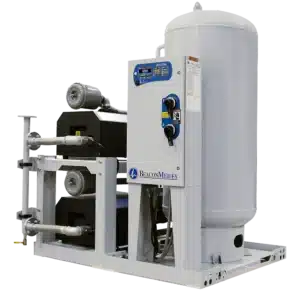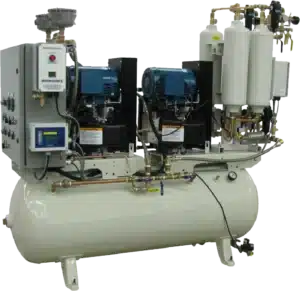The NFPA recommends periodic or annual medical gas testing of all positive pressure pipelines as well as waste gas and medical-surgical vacuum suction piping.
Medical Testing Solutions offers the most comprehensive annual medical gas testing in the industry. Our annual medical gas report consists of multiple sections, documenting zone by zone and including summary sheets of each zone and the medical gas equipment in each. We also include a plan of action report for any listed deficiencies or comments regarding the inspection. These reports can be accessed and updated via the cloud. Our testing procedures follow in strict compliance with the NFPA 99.
Medical gas outlets, alarms, zone valves, source source and labeling shall be tested and inspected on an annual basis. These testing procedures ensure to prolong the life and safety of a medical gas system and its components.
Medical gas outlets with a gauge pressure of 50 psi including, but not limited to oxygen, nitrous oxide, medical air, and carbon dioxide she’ll deliver 100 SLPM with a pressure drop of not more than 5 psi and static pressure of 50 psi to 55 psi. Medical gas outlets with a gauge pressure of 50 psi including, but not limited to oxygen, nitrous oxide, medical air, and carbon dioxide shall deliver 100 SLPM with a pressure drop of not more than 5 PSI and a static pressure of 50 psi to 55 psi. Oxygen and medical air outlet serving critical care areas shall deliver a transient flow of 170 SLPM for three seconds.
- Support gas outlets shall deliver 140 SLPM and have a pressure drop of no more than 5 PSI and have a static pressure of 160 PSI to 185 PSI.
- Medical-surgical vacuum inlets shall be tested and shall draw 3.0 SCFM without reducing the vacuum pressure below 12 inches of mercury (inHg) at any ajacent station inlet.
Zone valves shall include the proper labeling, function and be easily accessible. Records shall be made listing the rooms or areas controlled by each valve for each gas. The information shall be utilized to assist and verify the proper labeling of the valves.
Area alarm panels are tested for line pressure sensor accuracy. The warning signals from medical gas piping system shall be tested to verify an alarm condition if the pressure in the piping system increases or decreases 20% from the normal operating pressure for positive pressure gases. Vacuum systems shall alarm when the pressure drops below a gauge pressure of 12 inches of mercury (inHg).
A piping particulate test will be conducted on 25% of the zones, and tested at the outlet most remote from the source. Our filters are pre-weighted and measured on site. If any outlet produces more than 1 mg of matter, the outlet will be purged until clean.
Manifolds will be tested for alternation and proper function. Alarm set points will be triggered actuating an alarm at the master panels located within the facility.
Medical vacuum pumps, medical air compressors, and waste anesthesia gas disposal systems will all be cycled and all local alarm signals will be actuated to ensure proper system function. Temperature readings, amperage draw, voltage and a complete electrical control cabinet analysis will be completed and documented.
Master Alarm Panels shall be tested to ensure the proper signals are tied in from the the source equipment. Signals including but not limited to high pressure, low pressure, lag in use, high temperature, dew point high and high carbon monoxide, will be tested for proper function and alarm signal actuation at all master alarm panels. The results of these tests will be documented and accessible within our report.
At Medical Testing Solutions we take great pride in all that we do and the service we provide. We also take great pride in letting our clientele, prospective clients and others in the industry know that at MTS every member of our medical gas testing and inspection staff is a highly trained and certified, A.S.S.E 6020 Medical Gas Inspector, A.S.S.E 6030 Medical Gas Verifier, and ASSE 6040 Medical Gas Systems Maintenance Personnel. All the testing procedures which we conduct follow in strict compliance with current NFPA-99, 2015 Edition, CGA E-10, CGAC-9, TJC 2016 Accreditation Manual, AHCA Guidelines, and all other current applicable standards.
Contact us today for a same day rate quote. We look forward to providing you expert medical gas testing and inspection services for you and your facility.


